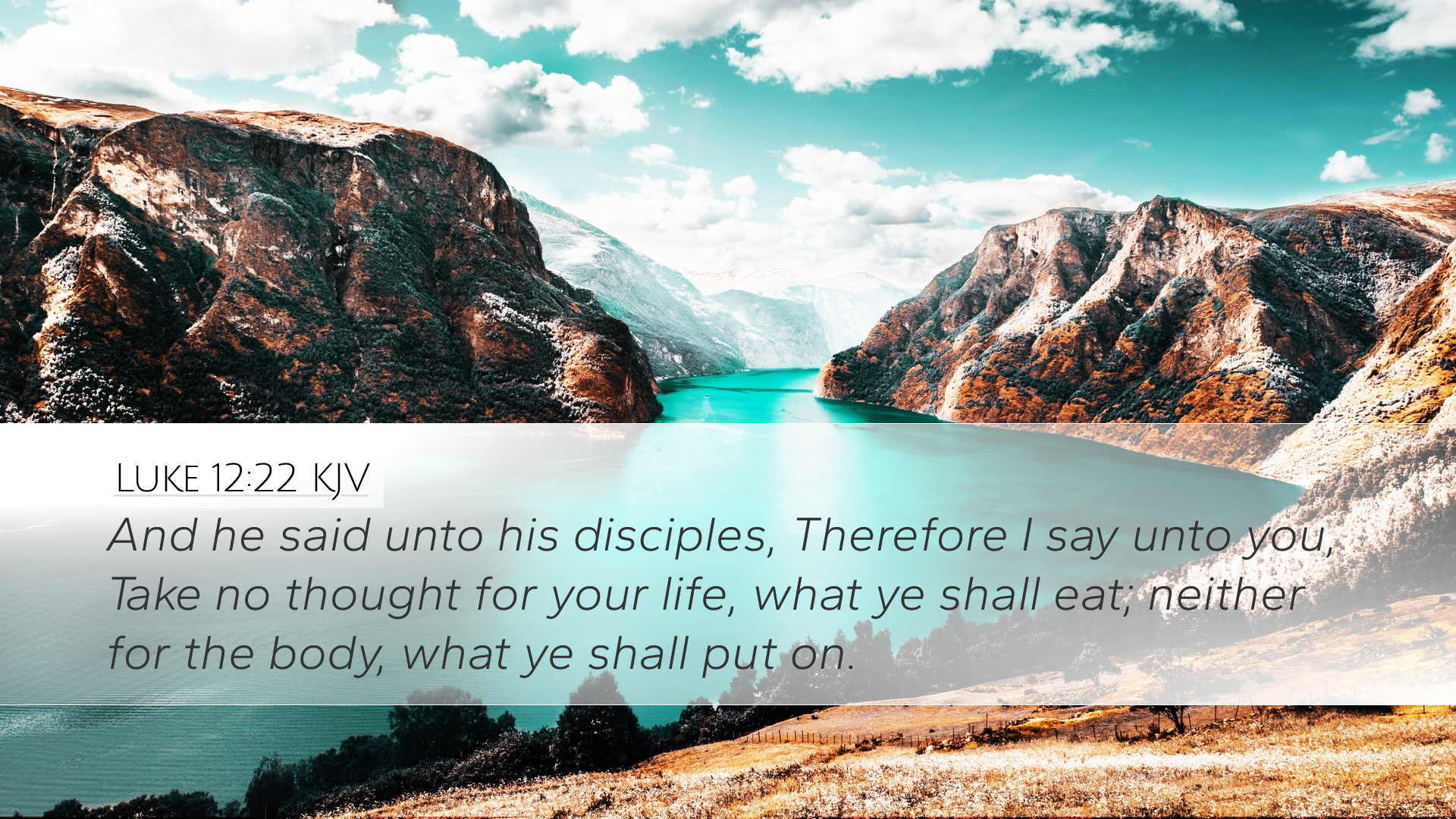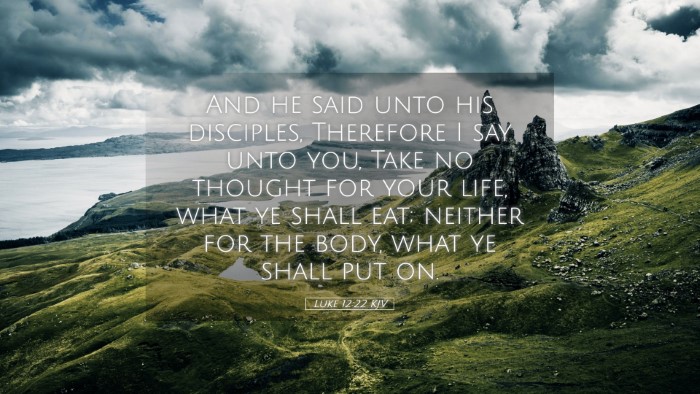Commentary on Luke 12:22
Verse: "And he said unto his disciples, Therefore I say unto you, Take no thought for your life, what ye shall eat; neither for the body, what ye shall put on."
Introduction
In this passage, Jesus addresses his disciples, urging them to abandon anxiety over their material needs. This teaching is vital for believers as it emphasizes trust in God’s provision and prioritizing spiritual over worldly concerns. The insights from renowned public domain commentaries like those by Matthew Henry, Albert Barnes, and Adam Clarke illuminate the richness of this verse.
Matthew Henry's Commentary
Matthew Henry emphasizes the call to trust in God as a foundational aspect of Christian life. He notes that the phrase "take no thought" does not imply neglecting one's responsibilities but rather encourages believers to refrain from anxious worrying. Such anxiety demonstrates a lack of faith in God's provision and care.
Henry elaborates that life is more than food and clothing, indicating that while physical needs are indeed important, they should not overshadow spiritual life. The essence of life lies in spiritual communion with God, who knows our needs even before we articulate them. He asserts that faith should result in peace, leading believers to focus on righteousness and trust over materialism.
Albert Barnes' Commentary
Albert Barnes offers a similar perspective, detailing how Jesus' admonition against worrying reflects a deep-seated theological truth: God's care for His creation. He notes that humans are more valued than birds, and just as God provides for the less valuable, He will undoubtedly care for His children.
Barnes also points out that constant worry is futile because it cannot add to one's lifespan or enhance well-being. He argues that genuine disciples should prioritize their relationship with God, which brings serenity and sustenance. Instead of tedious preoccupation with necessities, believers are encouraged to seek God's kingdom, promising that "all these things shall be added unto you" (Matthew 6:33).
Adam Clarke's Commentary
Adam Clarke provides a detailed exegesis of “take no thought,” explaining that the phrase relates to a form of deep worry or anxiety—not simply being concerned or planning. For Clarke, this teaching reassures believers against the trials of life, encouraging a holistic reliance on God.
Clarke’s commentary delves into the cultural context of the time, recognizing that Jesus' audience was largely composed of those experiencing economic hardship. He argues that in a climate of uncertainty, Jesus challenges societal norms by redirecting focus from temporal to eternal values. He underscores the assurance that God is aware of human needs, thus fostering a trusting relationship rather than one rooted in fear and apprehension.
Theological Implications
The verse presents profound implications for theology and practice. First, the call to release worry speaks volumes about the nature of faith. Trusting in God's provision invites a deeper spiritual reliance and nurtures a peace that surpasses understanding.
- Faith vs. Fear: This passage contrasts the spirit of faith with the spirit of fear, urging believers to cultivate an atmosphere of trust.
- The Sovereignty of God: It underscores God's sovereignty and care over creation, asserting that believers, being made in His image, hold a special place in that care.
- Prioritizing Spiritual Needs: The verse calls attention to prioritizing one’s spiritual life over material concerns, a theme echoed throughout biblical teaching.
Practical Applications
For pastors, students, and theologians, this passage provides rich ground for sermon preparation, teaching, and personal study. Consider the following applications:
- Encouragement to the Anxious: In pastoral ministry, use this verse to comfort those dealing with anxiety. Highlight God's provision and care.
- Faith Development: Challenge congregants to let go of material anxieties and develop a faith that relies on God’s promises.
- Focus on Eternal Values: Encourage personal reflection on spiritual priorities; engage in conversations about what it means to seek first the Kingdom of God.
Conclusion
Luke 12:22 serves as a poignant reminder of the need for believers to trust in the provision and care of God. Through the insights of Henry, Barnes, and Clarke, we see the depth of Jesus' call to reject anxiety in favor of faith—a foundational aspect of discipleship. Let us, therefore, approach our lives with a tranquil heart, filled with trust and a focus on the eternal rather than the temporary.


